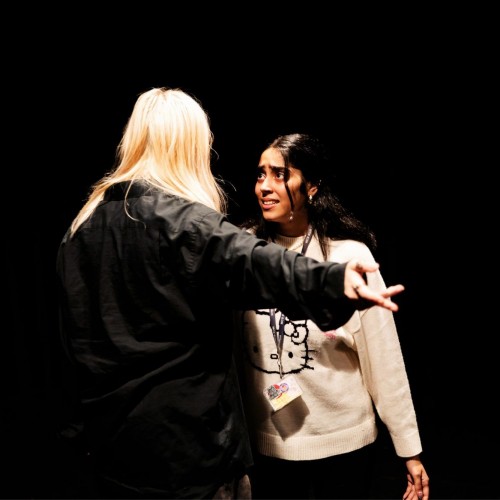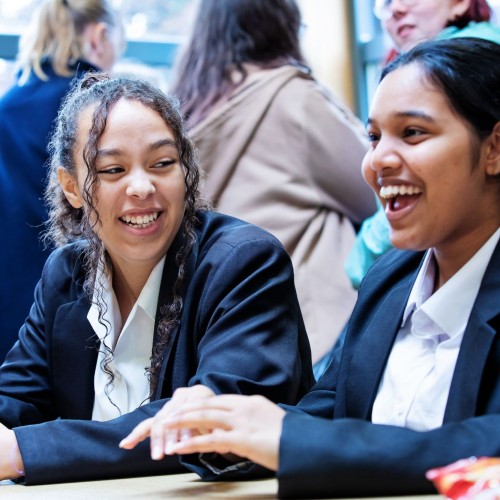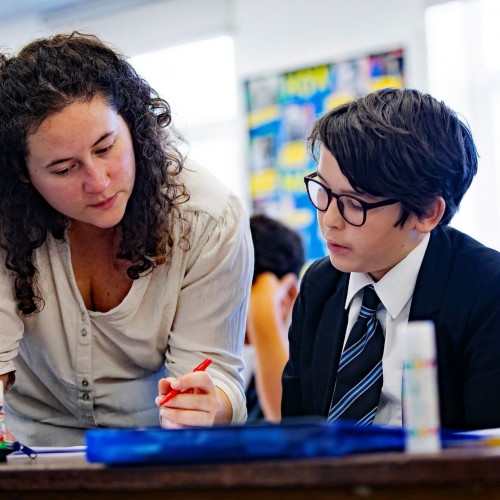English
Clear communication is an essential and transferrable life skill, so the main emphasis of our teaching is always the development of our students’ facility with language. We explore ideas through reading and listening, then communicating ideas through writing and speaking with clarity. We believe that Literature enhances our lives and allows us to empathise with people different than ourselves; to develop our imaginations, and become more creative, productive citizens.
| Year 7 | - Introductory Writing unit - Myths and legends: The Odysee - Novel Study: The Lion, the Witch and the Wardrobe - Shakespeare: A Midsummer Night's Dream - Auditory Poetry - Writing with a Viewpoint |
| Year 8 | - Writing about Society - Gothic and the Supernatural - Detectives and True Crime |
| Year 9 | - Plays in context: An Inspector calls - Creative Writing: Extreme Environments - War poetry - Novel study: Girl. Boy. Sea - Shakespeare: The Tempest |
| Year 10 | - Anthology Poetry (Power and Conflict) - Part one - Language Paper one - 19th Century Novel: A Christmas Carol - Anthology Poetry - Part two - Language Paper two - Modern Text: My Name is Leon |
| Year 11 | - Modern Novel - Revising English Language and Listening - Shakespeare: Romeo and Juliet |
| Year 12 Eng Lang and Lit |
- Component 1: Non Fiction and Spoken Text Anthology - Component 2: Language of Poetry and Plays - Component 3: Creative Writing - component 4: Coursework preparation |
| Year 12 Eng Lit |
- Duffy Poems - Modern Times: The Handmaid's Tale - Modern Times: A Streetcar named Desiree - Love through the Ages: Poetry Anthology - Love through the Ages: Gatsby |
| Year 13 Eng Lang and Lit |
- Component 1: Non Fiction and Spoken Text Anthology - Component 2: Language of Poetry and Plays: Jerusalem - Component 3: Creative Writing - Stylistic Revision - NEA coursework |
| Year 13 Eng Lit |
- Duffy Poems - Modern Times: A Streetcar named Desiree: Unseen Prose - Revision: Duffy; Handmaid's Tale - Love through the Ages: Othello - Love through the Ages: Gatsby |
All students take part in two ‘challenges’ within their English curriculum:
The Reading Challenge: Students are expected to read regularly across a range of texts. The ‘Reading Challenge’ provides a structure with recommended reads and the chance to share your reading with peers. Students have regular access to the School Library through English lessons. Reading and recommendations are shared in these Library lessons.
The Writing Challenge: Each term students are engaged in a creative writing challenge. Different topics and stimulus materials are shared, explored and developed. As with the Reading Challenge, sharing this writing with peers is a key element.
In the Sixth Form students can choose from two disciplines within the English curriculum:
Those studying English Language & Literature, focus on the question of style in literature (the field of stylistics), and consider, for example, how poets create a “voice” within a poem, and how novelists and playwrights create vivid characters and distinct viewpoints using language techniques. The “language” element of this subject is stylistics, and does not resemble the GCSE in English Language the students take in Year 11. The big ideas of the subject are genre, narrative, point of view, register, representation, and literariness. Students will explore the difference between everyday language and ‘literature’; developing their ability to understand and communicate in different ‘modes’ of English. English Language and Literature is a combined course that offers opportunities for creative writing, both in exam conditions and through coursework.
Students following the English Literature curriculum study a range of texts created over the last 500 years. Teaching focuses on the ‘historicist’ approach: considering how writers influence each other, and also how events and social changes are reflected in novels, poetry and plays. Students will consider literary themes across time as well as how a specific historical moment has influenced the literature of the day. English Literature is full of ‘Big Ideas’, encouraging students to consider themes and issues that extend beyond the pages of a book and into contemporary life.
Both disciplines include an individual critical essay element. This challenges students to read, analyse and write about text of their own choice from a particular academic viewpoint.



